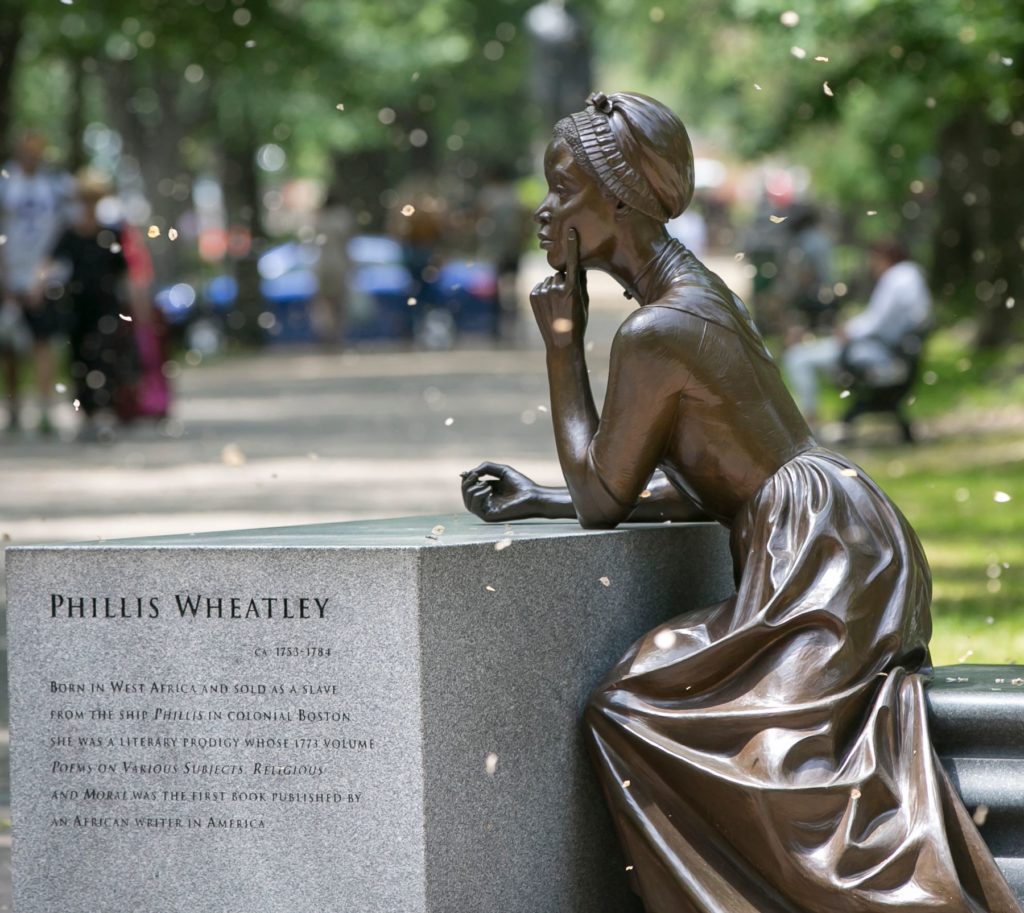Presented by Revolutionary Spaces
Written by Ade Solanke
Directed by Regge Life
Featuring: Bobby Cius, Adreyanua Jean-Louis, Priscilla Manning, Joshua Olumide, Serenity S’rae
November 3 – December 3, 2023
Old South Meeting House
310 Washington Street
Boston, MA 02108
Critique by Kitty Drexel
“On Being Brought from Africa to America”
By Phillis Wheatley
“’Twas mercy brought me from my Pagan land,
Taught my benighted soul to understand
That there’s a God, that there’s a Saviour too:
Once I redemption neither sought nor knew.
Some view our sable race with scornful eye,
“Their colour is a diabolic die.”
Remember, Christians, Negros, black as Cain,
May be refin’d, and join th’ angelic train.”
BOSTON, Mass. — Revolutionary Spaces presents Phillis in Boston by Ade Solanke at the Old South Meeting House in Boston. Directed by Regge Life. Performances run approximately 90 minutes. There is no intermission.
Phillis in Boston is an historical play about Phillis Wheatley, an African woman born in Gambia, who was kidnapped by slave traders around 1753 and sold into enslavement to the Wheatley family in Boston. Educated to read and write by the Wheatley family, she began to write poetry around the age of 14. Wheatley was admitted to Old South Meeting House’s segregated congregation when she was about 18 years old.
Phillis, a devout Christian literary prodigy, became the first African American woman to publish a book of poetry in English in 1773. Her book Reflections on Various Subjects, Religious and Moral was published in London because she was refused her publication in New England. In the New England newspapers, Wheatley was lauded on one page while other enslaved Africans were sold on another. It was the first known book of poetry in English by an African and the third book published by an American woman.
Phillis Wheatley was emancipated shortly after her return to Boston from London. Phillis in Boston dramatizes Wheatley’s celebrated return, her mission to share her book and its coinciding with the infamous Boston Tea Party protests. It examines the inherent political hypocricy of Wheatley’s (and all New England’s enslaved people’s) emanication and her support for a more free society for the African American community in the location where it originally happened. This play commemorates the 250th anniversary of the Boston Tea Party while recognizing Wheatley’s unsung history as a patriot for the true liberation of all.
In this play, Phillis Wheatley (a modest yet confidant Adreyanua Jean-Louis) learns to embrace her recent freedoms as Boston negotiated protests against King George’s tea taxes. She confides in her friend Obour Tanner (stalwart Serenity S’rae) and convenes with mighty community leader Prince Hall (Joshua Olumide) while she distances herself from her former owner Susanna Wheatley (Priscilla Manning). Bobby Cius plays Wheatley’s love interest John Peters.

A statue of Phillis Wheatley in Boston by Meredith Bergmann, dedicated in 2003. © Jixue Yang/Dreamstime.com
Phillis in Boston is a living play: its playwright is alive to collaborate with this production; its director was in the audience on Wednesday evening; its cast and crew shaped the performance in these preview performances. (Give them a raise, please. The Arts don’t pay enough even when they do.)
Since Phillis in Boston is a living play, it has bumps and edges as well as moments of true artistic bliss. That’s the glory of new works. The dialogue between Phillis and Obour in the second act deflated because the actors’ energy dropped. And, the joy expressed by Phillis, Obour, Prince, and John when they discuss the change Phillis’ book will enact is a moment of collaborative unity. We can’t see some of the characters’ interactions because they are staged in the pews. We can see the subtle spark of romance between Phillis and John when they first meet. The actors are still working their lines into their bodies, but the work they’d already done was so complete that I was convinced the script binder used during Wednesday’s performance was an odd but intentional prop.
Playwright Ade Solanke captures a moment in Phillis in Boston that resonated with the audience. A sick Susanna Wheatley pleads with Phillis to abandon her book to care for Susanna instead. Susanna says she saved Phillis from death by purchasing her as a sickly toddler. Susanna assumes Phillis will be so grateful to her that Phillis will voluntarily re-enslave herself to care for Susanna.
Phillis replies with gratitude and the assertion that her life became her own when Susanna freed her. Phillis was born free in Africa. Susanna merely returned to Phillis the freedom she should have always had. Slavery, racism and its abuses were (are?) so assumed that Susanna can’t conceive of a reality in which Phillis is independent of the Wheatley family.
We, the audience members, have a moral responsibility to fight against racist practices: microaggressions, microaggressions, colonial ideologies, violence, and other abuses. By doing so, we are not entitled to anything or anyone: not gratitude, not a special club in which we’re the cool white people, nothing.
Equity is the work and the reward. Please consider this when buying a ticket.
Seminal pop artist and philosopher of 2022 Lizzo said “History is freaking cool, you guys.” She was right. Go check out Phillis in Boston.
